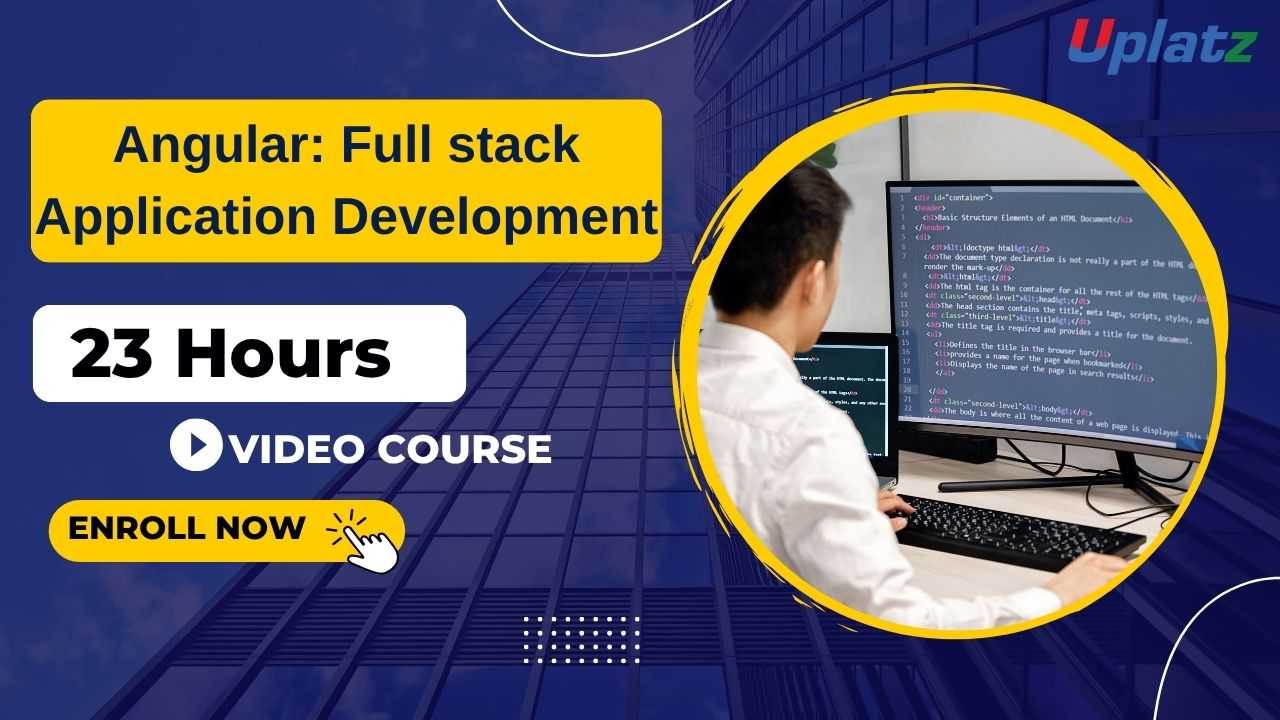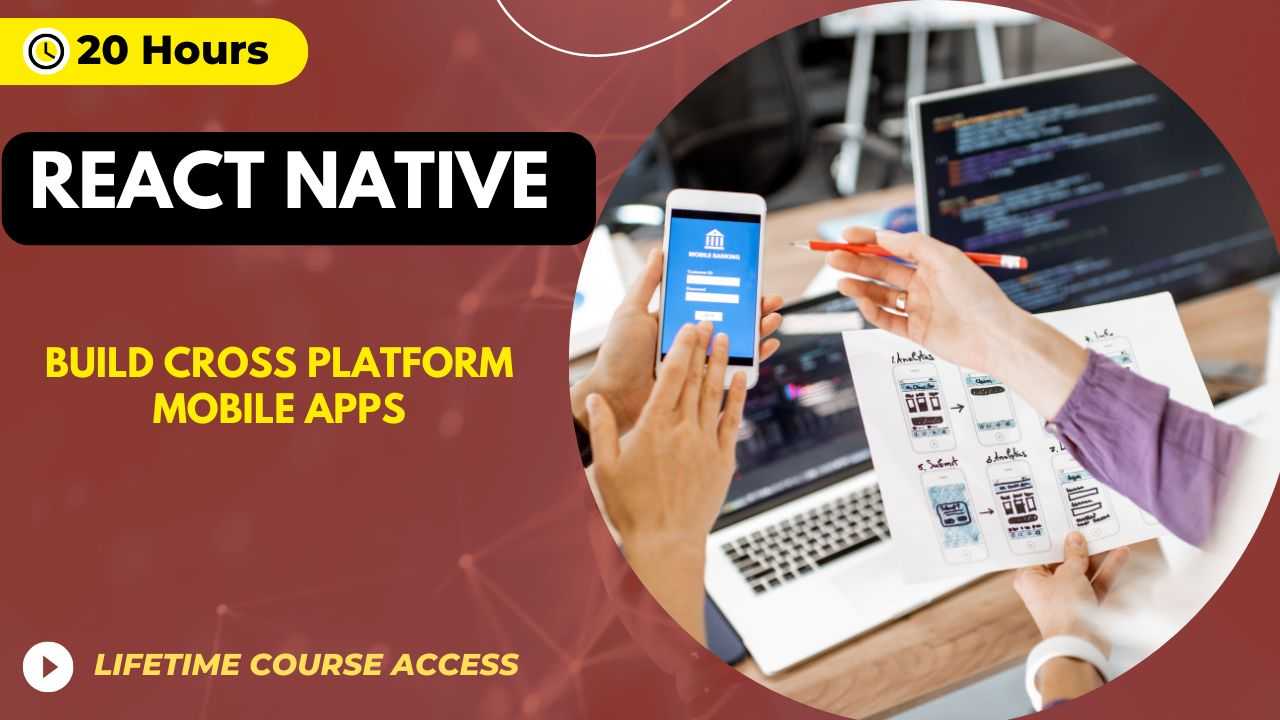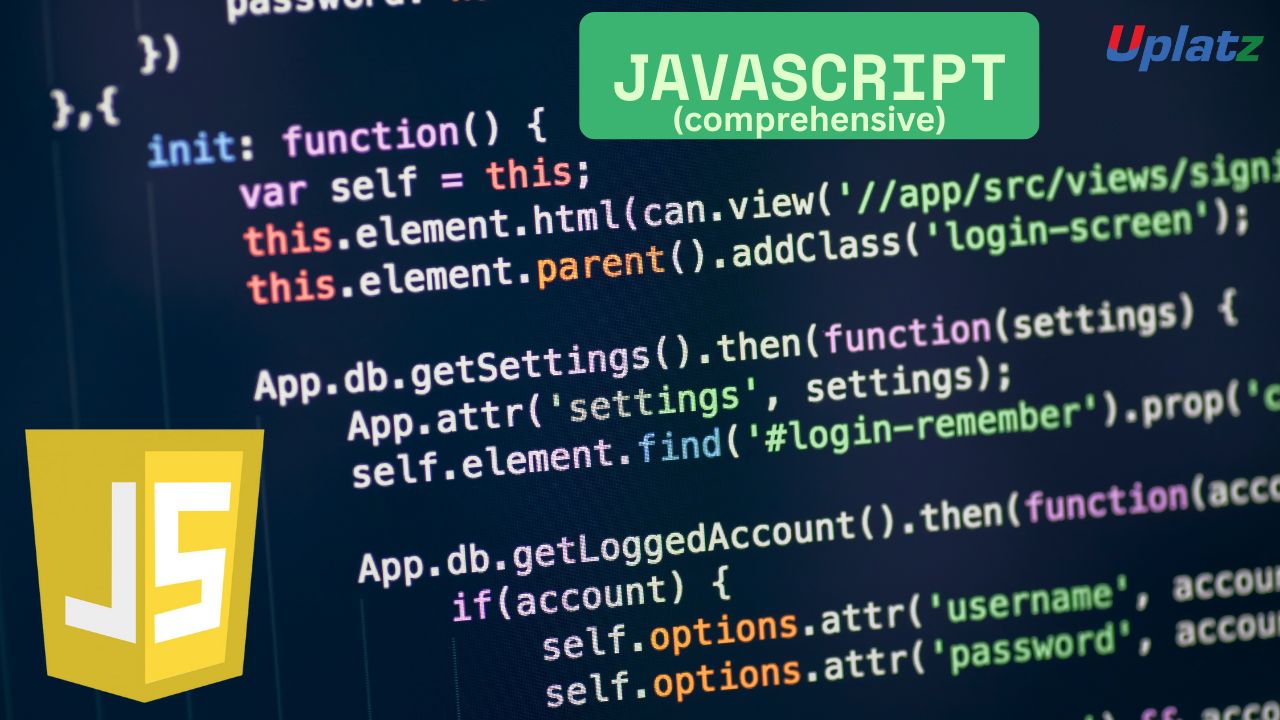TypeScript
Unlock the full potential of modern web development by mastering TypeScript, from core syntax to full-stack integration and project deployment.Preview TypeScript course
Price Match Guarantee Full Lifetime Access Access on any Device Technical Support Secure Checkout Course Completion Certificate 88% Started a new career
BUY THIS COURSE (GBP 29)
88% Started a new career
BUY THIS COURSE (GBP 29)
-
 95% Got a pay increase and promotion
95% Got a pay increase and promotion
Students also bought -
-

- Angular: Full-Stack Application Development
- 23 Hours
- GBP 12
- 1249 Learners
-

- React Native
- 20 Hours
- GBP 12
- 2788 Learners
-

- JavaScript Programming (comprehensive)
- 15 Hours
- GBP 12
- 1648 Learners

TypeScript has become the backbone of modern, large-scale web and enterprise application development. This Mastering TypeScript – Self-Paced Online Course by Uplatz provides a deep, practical understanding of how to use TypeScript to build reliable, maintainable, and scalable software. Whether you’re a frontend developer expanding beyond JavaScript, a backend engineer seeking better structure, or a full-stack professional building production-grade apps, this course will equip you with the tools, patterns, and mindset to code confidently with TypeScript.
🔍 What is TypeScript?
TypeScript is a statically typed superset of JavaScript created by Microsoft. It builds on JavaScript by adding strong typing, interfaces, classes, modules, and advanced object-oriented features—while still compiling down to clean, browser-compatible JavaScript.
With TypeScript, developers can catch errors early, write more predictable code, and maintain large applications with confidence. It combines the flexibility of JavaScript with the discipline of strong typing, allowing teams to produce more stable and scalable software.
In short, TypeScript offers the power of a strongly-typed language without losing the accessibility and ubiquity of JavaScript. This makes it the default language of choice for enterprise-grade development and complex modern web ecosystems.
⚙️ How TypeScript Works
TypeScript enhances JavaScript by introducing static type checking at compile time. Developers declare data types for variables, parameters, and functions, allowing the compiler to detect potential issues before execution. The TypeScript compiler (tsc) then translates the code into standard JavaScript that runs seamlessly in browsers or Node.js environments.
Key features include:
-
Type inference – automatic detection of data types.
-
Interfaces & classes – to enforce structure and design patterns.
-
Modules & namespaces – for code organization and reusability.
-
Generics – for building flexible and reusable components.
-
Decorators & metadata – for advanced frameworks like Angular.
-
Tooling integration – smooth experience with editors like VS Code.
By compiling to JavaScript, TypeScript ensures backward compatibility while adding layers of reliability and scalability.
🏭 How TypeScript is Used in the Industry
TypeScript is now a core technology in modern software engineering. It’s the foundation for frameworks such as Angular, NestJS, Remix, and widely adopted in React and Node.js ecosystems. Industry leaders like Microsoft, Google, Slack, Airbnb, and Asana rely on TypeScript to manage complex, distributed codebases efficiently.
Typical use cases include:
-
Enterprise web applications where consistency and maintainability are critical.
-
Frontend frameworks (React, Angular, Vue) for building modular UI systems.
-
Backend services built with Node.js and Express or NestJS for type-safe APIs.
-
Cross-platform development with Ionic or React Native.
-
Cloud and DevOps tooling, thanks to strong integration with modern CI/CD systems.
The ability to prevent runtime errors, enhance collaboration, and enforce clean architecture has made TypeScript an industry standard. As companies continue to migrate from JavaScript, TypeScript proficiency is one of the most in-demand developer skills worldwide.
🌟 Benefits of Learning TypeScript
Learning TypeScript offers both immediate and long-term benefits for developers and teams:
-
Early Error Detection: Strong typing helps identify issues before runtime, reducing debugging time.
-
Maintainable Code: Type definitions make large projects easier to scale and refactor.
-
Team Collaboration: Explicit interfaces improve communication and understanding across teams.
-
Better Tooling & Autocompletion: IDEs like VS Code provide intelligent hints, refactoring, and navigation.
-
Cross-Framework Compatibility: Works with Angular, React, Vue, and Node.js.
-
Enhanced Career Opportunities: Companies increasingly require TypeScript skills for full-stack and enterprise roles.
-
Future-Proof Development: TypeScript aligns with ECMAScript standards and evolves with JavaScript’s future.
By mastering TypeScript, you don’t just learn a language—you learn a professional development discipline that improves every aspect of your coding workflow.
📘 What You’ll Learn in This Course
This self-paced course goes beyond syntax and typing. You’ll gain the practical knowledge needed to apply TypeScript in real-world applications. Topics include:
-
Static and dynamic typing fundamentals
-
Working with variables, data types, and functions
-
Object-oriented programming using classes and inheritance
-
Creating and extending interfaces and abstract classes
-
Modules, namespaces, and dependency management
-
Using generics and utility types effectively
-
Working with async/await and promises
-
Type guards, discriminated unions, and advanced typing
-
Integrating TypeScript with React, Angular, and Node.js
-
Compiling, building, and deploying TypeScript applications
-
Debugging, testing, and performance optimization
Each lesson features hands-on exercises, real-time coding demos, and practical projects that mirror real development environments.
By the end, you’ll have built multiple TypeScript-powered applications and a portfolio-ready capstone project demonstrating your mastery of modern web development practices.
🧠 How to Use This Course Effectively
To maximise your learning:
-
Prepare Your Workspace – Install Node.js, VS Code, and the TypeScript compiler.
-
Set Clear Goals – Plan weekly learning targets for consistent progress.
-
Code Along – Don’t just watch; type every example and experiment with variations.
-
Build Mini-Projects – Reinforce each topic with a simple project (e.g., task manager, weather app).
-
Engage with Communities – Join TypeScript forums and GitHub projects.
-
Document Your Learning – Maintain notes or a blog to deepen understanding.
-
Capstone Project – Apply all concepts to build a full-stack TypeScript app.
-
Review and Certify – Retake quizzes, rewatch challenging modules, and download your certificate once complete.
👩💻 Who Should Take This Course
This course is ideal for:
-
JavaScript Developers upgrading to a more structured, type-safe language.
-
Frontend Engineers using React, Angular, or Vue.
-
Backend Developers working with Node.js or Express.
-
Full-Stack Developers seeking consistency across both ends.
-
Software Engineers standardising enterprise projects.
-
Beginners eager to start with a future-proof language.
No matter your background, this course adapts to your pace and provides both beginner-friendly guidance and advanced deep dives.
🧩 Course Format and Certification
The course is fully self-paced, with lifetime access and regular updates. You’ll learn through:
-
HD video tutorials
-
Code-along demonstrations
-
Downloadable resources and exercises
-
Real-world mini-projects
-
Quizzes and review checkpoints
Upon completion, you’ll earn a Course Completion Certificate from Uplatz, demonstrating verified TypeScript proficiency and practical programming competence.
🚀 Why This Course Stands Out
-
Comprehensive Coverage – From core concepts to advanced architecture.
-
Industry Focused – Aligns with professional workflows and interview expectations.
-
Hands-On Learning – Build real applications instead of passive reading.
-
Self-Paced Flexibility – Learn at your convenience with lifetime updates.
-
Career-Ready Outcomes – Master skills sought after in modern web development.
By the end, you’ll confidently use TypeScript in production environments, architect robust applications, and stand out as a developer capable of handling complex full-stack challenges.
🌐 Final Takeaway
In today’s competitive tech landscape, TypeScript isn’t optional—it’s essential. It bridges the gap between fast development and long-term maintainability, ensuring that developers produce cleaner, safer, and more scalable code.
The Mastering TypeScript – Self-Paced Online Course by Uplatz gives you the roadmap, structure, and resources to become a proficient TypeScript developer. Whether you’re upgrading your JavaScript knowledge, pursuing a new career path, or leading a team toward cleaner codebases, this course will guide you every step of the way.
Start learning today, and future-proof your web development career with one of the most in-demand skills in the programming world.
Course/Topic 1 - Course access through Google Drive
-
Google Drive
-
Google Drive
By the end of this course, learners will be able to:
- Understand the fundamentals of TypeScript and its advantages over JavaScript.
- Write clean and type-safe code using advanced TypeScript features.
- Work with object-oriented programming concepts like classes, interfaces, and inheritance.
- Build modular applications with TypeScript and integrate with tools like React, Vue, Angular, and Node.js.
- Leverage utilities such as generics, decorators, namespaces, and mixins.
- Create type-safe libraries, reusable components, and scalable app architectures.
- Develop and debug TypeScript applications using tools like Jest, Babel, and Webpack.
- Build full-stack applications using Express.js and React/Redux with TypeScript.
- Implement robust state management and API integration in both web and mobile environments.
- Prepare TypeScript projects for production, testing, and deployment.
TypeScript - Course Syllabus
Module 1: Introduction to TypeScript
- Introduction to TypeScript
- What is TypeScript?
- Why should we learn TypeScript?
- TypeScript vs JavaScript
- Setting Up TypeScript Environment
- Installing TypeScript
- Writing your first TypeScript program
- Understanding the TypeScript project structure
- Configuring tsconfig.json
Module 2: TypeScript Basics
- Basic TypeScript Syntax
- Primitive types (string, number, boolean, etc.)
- Explicit vs inferred types
- Complex Types
- Arrays, Tuples, and Enums
- Union and Intersection types (with examples)
- Advanced TypeScript Types
- Interfaces and Type Aliases
- Default values, unions, and intersections
- Type Assertions, Function Types, and Generics
- Type assertions
- Function types
- Introduction to Generics
Module 3: Object-Oriented TypeScript
- Working with Classes and Objects
- Creating classes and objects
- Access modifiers (public, private, protected)
- Readonly properties
- Advanced Class Features
- Getters and setters
- Static properties and methods
- Abstract classes and inheritance
- Object-Oriented Programming in TypeScript
- Implementing OOP principles
- Hands-on project
Module 4: TypeScript Modules and Integration
- Understanding TypeScript Modules
- Organizing and using modules
- Importing and exporting
- Integrating TypeScript with JavaScript Frameworks
- Using TypeScript with React and Node.js
- Declaration Files and Frontend Tooling
- Using declaration files (.d.ts)
- Working with frontend tools like Webpack and Babel
Module 5: TypeScript Utilities and Features
- Useful TypeScript Utilities
- Utility types (Partial, Readonly, Record, etc.)
- Best practices
- Function Types and Overloading
- Function signatures
- Overloading functions
- Deep Dive into TypeScript Classes and Inheritance
- Extending classes
- Using mixins
- Exploring Access Modifiers and Readonly Properties
- Real-world examples
Module 6: Hands-on TypeScript Projects
- Building a Modular Application
- Structuring a scalable TypeScript app
- Building a Type-Safe Library
- Creating a library with strict typing
- TypeScript with Angular
- Setting up an Angular project with TypeScript
- Using TypeScript with Vue.js
- Developing a Vue.js project with TypeScript
Module 7: Error Handling, Debugging, and Compilation
- Error Handling in TypeScript
- Catching and managing errors
- Debugging TypeScript code
- Understanding TypeScript Compiler Options
- Exploring tsc options
Module 8: Advanced TypeScript Concepts
- Working with TypeScript Mixins
- Creating reusable mixins
- Building a Notification System using Mixins
- Hands-on project
- Exploring TypeScript Decorators
- Class, method, and property decorators
- Advanced Generics in TypeScript
- Conditional types and mapped types
Module 9: Full-Stack TypeScript Development
- Building a REST API with TypeScript
- Setting up an Express.js backend with TypeScript
- Creating Endpoints and Handling Requests
- CRUD operations
- Setting Up a TypeScript Frontend Project
- Configuring a frontend app
- State Management with TypeScript
- Using Vanilla TypeScript, Context API, and Redux
- TypeScript Routing
- Handling navigation with React Router
- API Integration with TypeScript
- Using Axios with TypeScript
- Unit Testing in TypeScript
- Testing with Jest
- Preparing for Production and Deployment
- Best practices for production-ready TypeScript apps
Module 10: TypeScript for Mobile Development
- Why Use TypeScript with React Native?
- Benefits of TypeScript in mobile apps
- Creating a React Native Project with TypeScript
- Step-by-step guide using Expo
Module 11: TypeScript Namespaces and Utility Projects
- Understanding TypeScript Namespaces
- Organizing code with namespaces
- Quote Generation Project with TypeScript
- Step-by-step project
- Blog Post Manager Project
- CRUD operations in TypeScript
- Blog Post Manager with SQLite
- Database integration
- Building a Password Generator in TypeScript
- Node.js and React implementations
Module 12: Interview Preparation & Conclusion
- Common TypeScript Interview Questions
- Explanation with examples and tables
Upon successful completion of the TypeScript course, learners will receive a Course Completion Certificate from Uplatz, validating their expertise in modern web development using TypeScript.
This certificate is a powerful credential to showcase your proficiency with type-safe coding practices, scalable architecture, and integration with leading frameworks like Angular, React, Vue, and Node.js.
Mastering TypeScript significantly boosts your employability in today’s development landscape, where scalable, maintainable code is essential. TypeScript is widely adopted in enterprise and startup environments across web and mobile ecosystems.
Job Roles You Can Pursue:
- TypeScript Developer
- Front-End Developer (React/Angular/Vue + TS)
- Full-Stack JavaScript Developer
- Node.js Engineer with TypeScript
- Mobile App Developer (React Native + TS)
- TypeScript Architect or Consultant
Industries Hiring TypeScript Professionals:
- Software Development & IT Services
- Finance & Banking Technology
- eCommerce & Retail
- SaaS & Cloud Platforms
- Media & Publishing
- Healthcare Technology
- What are the key differences between TypeScript and JavaScript?
TypeScript adds static typing and compile-time checks to JavaScript, enabling better tooling, error prevention, and refactoring. - How does TypeScript handle types in comparison to JavaScript?
TypeScript allows both explicit and inferred typing, enabling developers to define types for variables, functions, and objects. - What are Union and Intersection types in TypeScript?
Union types allow a variable to hold multiple types (string | number), while intersection types combine multiple types (TypeA & TypeB). - Explain interfaces vs. type aliases.
Interfaces define object shapes and support extension, while type aliases are more flexible and can represent any type including primitives and unions. - How are generics used in TypeScript?
Generics allow writing reusable and type-safe code, enabling components and functions to handle multiple data types. - What are access modifiers in classes?
Access modifiers (public, private, protected) control the visibility of class properties and methods, enforcing encapsulation. - What are declaration files in TypeScript?
Declaration files (.d.ts) provide type definitions for existing JavaScript code, enabling TypeScript to understand third-party libraries. - How does TypeScript integrate with React or Node.js?
TypeScript can be configured in React using tsx files and works seamlessly with Node.js using ts-node or compiled output. - What are decorators in TypeScript?
Decorators are annotations for classes and members that enable meta-programming, commonly used in Angular and advanced design patterns. - How can TypeScript improve debugging and code maintenance?
With static type checks, intelligent tooling, and better refactor support, TypeScript reduces runtime errors and makes code easier to manage.









